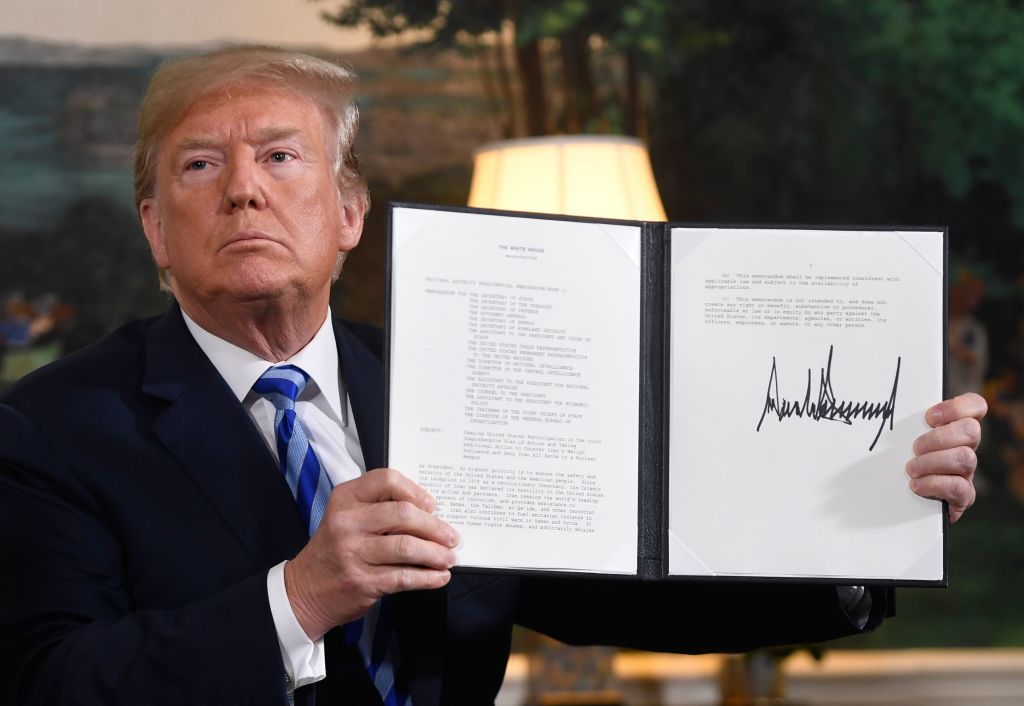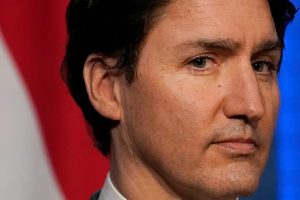After sending his all-caps tweet last week warning Iranian President Hassan Rouhani never, ever to threaten the United States again or risk armageddon, this week Donald Trump told a press conference that he would be more than happy to meet with the Iranian leader – anytime, anywhere, without preconditions and from neither a position of strength nor weakness – to discuss the diplomatic impasse over Iran’s nuclear energy programme. In the interim, the head of Iran’s formidable Republican Guard Corps, Major General Qasem Soleimani, had responded to Trump’s tirade with one of his own, threatening merciless retaliation against US interests globally should Iran be attacked. ‘Come. We are ready. If you begin the war, we will end the war,’ he said. Trump didn’t even respond.
There are echoes here, of course, of the threats and counter-threats hurled between the American and North Korean leaders, but which culminated last month only in a summit between Trump and Kim Jong-un in sunny Singapore where they heaped praise on one another. We should therefore not be the least surprised by an announcement before November 4 – the deadline by which the US could begin to impose sanctions on all countries which refuse to cut economic ties with Iran – that Trump and Rouhani are to meet in person somewhere in the tropics. And the reason for the compromise will be the same. Just as the US could not have attacked North Korea without risking the destruction of Seoul and half of Japan in the blink of an eye, so an attack on Iran would have immediate and devastating consequences for the global economy (if Iran blocked, as it is promising to, the Strait of Hormuz, through which one third of the world’s oil supply passes) and for Israel (from a ferocious Hezbollah-led rocket attack on that country that could last 24-hours a day for weeks on end).
At first glance, the hubristic stance has ominous echoes of the build up to the overthrow of Saddam Hussein. But we should recall how, post-Vietnam, the US had acted militarily like the proverbial school-yard bully, picking fights only with the weaklings – Afghanistan, Iraq, Somalia, Libya – who can’t fight back. Iran’s leaders, who are convinced of nothing more than their own military might and regional political clout, have an instinctive grasp of this reality. Small wonder that at a recent UN meeting, Trump reportedly asked to meet with Rouhani no few than eight times, only for the latter repeatedly to tell him to get lost. And on Tuesday, Iran’s deputy speaker Ali Motahari told state media, “negotiation with the Americans would be a humiliation now.”
In fact, US impotence in the face the perceived Iranian threat was evident in the midst of Trump’s latest flip-flopping. Gulf Arab leaders have been invited to Washington for a summit hosted by Trump – tentatively scheduled for mid-October – which principally aims to draw up a strategy for Iran’s regional containment. The goal is to create a new security and political alliance comprising the six Gulf Arab states, plus Egypt and Jordan. If this plan to forge a US-backed collective Sunni front – known as an ‘Arab Nato’ – to confront Iranian expansionism sounds preposterous, that’s because it is.
After all, a diplomatic rift between Saudi Arabia and Qatar over the latter’s close ties with Iran has already torn apart the Gulf Cooperation Council, with Kuwait and and Oman refusing to back the Saudis and Emiratis. Jordan’s army, meanwhile, is a complete joke. And Egypt’s has the unfortunate distinction of never having won a war. Indeed, years after the Egyptian military was deployed en masse for the first time since 1973, but this time inside their own country, it has failed even to quell an insurgency in North Sinai led by a few hundred jihadis. And more to the point: Egyptian President Abdel Fattah el-Sisi, bedeviled by economic woes at home and ruling over a population that hates Israel with a far greater passion than it ever could Iran, has no interest in confronting the latter.
So that just leaves Saudi Arabia and the UAE, whose years-long combined military offensive against Yemen – the most impoverished Arab nation, and the seventh poorest country in the world – has achieved precisely nothing other than the mass slaughter of innocents. Iran’s military leaders – who lost a million men in the 1980-88 war against an Iraq then backed by the entire Sunni world and the West, but didn’t concede an inch of territory – must be quaking in their turbans.
Nor is Trump on firmer ground on the sanctions front. China and Russia were never going to stop importing Iranian oil, and Turkey and India are adamant that they won’t either. The EU, eager to tap into the billions of dollars of investment up for grabs in a post-sanctions Iranian economy. is desperately looking into ways to circumnavigate US sanctions. Worse for Trump is that a HuffPost/YouGov survey published last week showed just 23 per cent of the public say the would support the US deciding to declare war on Iran, while the majority, 53 per cent, oppose the idea. Just 9 per cent would strongly support declaring war, while 37 per cent are strongly opposed. Only 48 per cent of Trump’s own supporters back him. At home and abroad, Trump has every incentive, in other words, to pull off another North Korea.


















